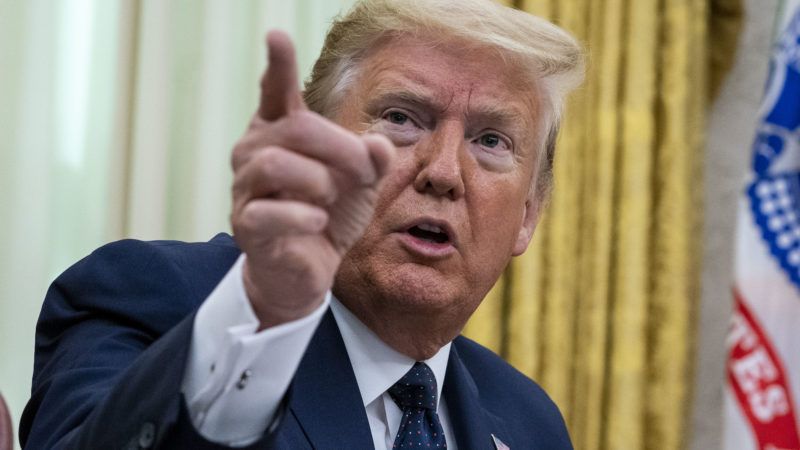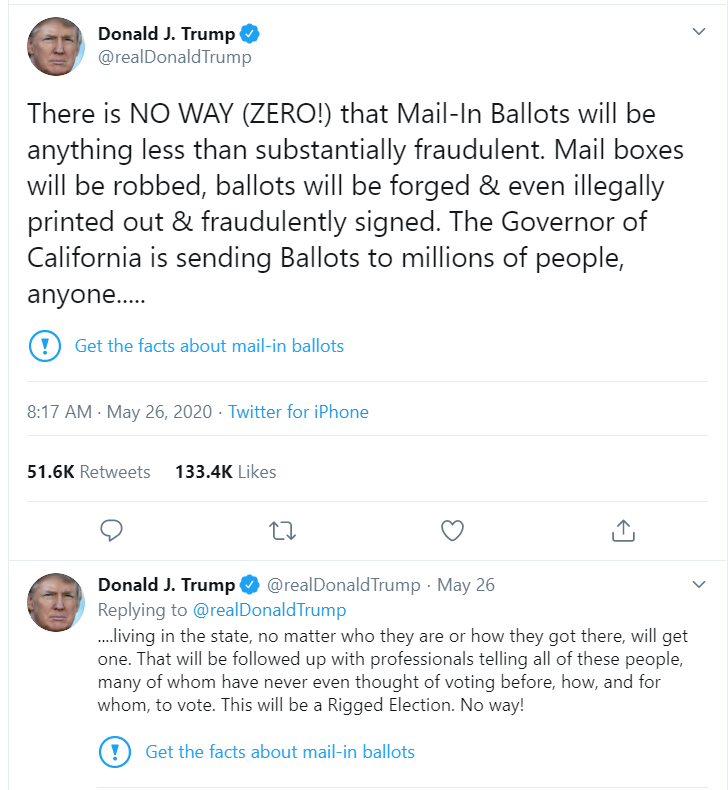Donald Trump vs. Joe Biden vs. Twitter vs. Facebook
Thank god for the First Amendment and the feuds among powerful politicians and platforms that will keep free speech alive.

After Twitter annotated his comments about mail-in voting and fraud, President Donald Trump responded yesterday with an "Executive Order on Preventing Online Censorship." As with many official announcements, the headline is misleading: The order is in fact about creating, not preventing, online censorship. It reads in part:
Online platforms are engaging in selective censorship that is harming our national discourse. Tens of thousands of Americans have reported, among other troubling behaviors, online platforms "flagging" content as inappropriate, even though it does not violate any stated terms of service; making unannounced and unexplained changes to company policies that have the effect of disfavoring certain viewpoints; and deleting content and entire accounts with no warning, no rationale, and no recourse.
We'll get to some technical details in a moment. But the first thing to note is that this can all be true and still be perfectly legal. That's a feature, not a bug, of online discourse.
When it comes to the immediate cause of action, Twitter didn't delete or ban the president's message but instead flagged it with a fact-check message. Twitter had announced earlier in the month it would label tweets it thought were misleading or wrong about the novel coronavirus and other topics. Labeling the president's tweet in this way was clearly a middle-finger gesture to the president, less because of the specific content in a given tweet and more because of who the author is and the overtly political nature of the speech. (Even in private contexts, political speech has always been the most-protected sort of expression.)

Today, the service went a step further with a presidential tweet about the violence and looting that broke out Minneapolis during a demonstration against the police killing of George Floyd. "These THUGS are dishonoring the memory of George Floyd, and I won't let that happen," wrote Trump. "Just spoke to Governor Tim Walz and told him that the Military is with him all the way. Any difficulty and we will assume control but, when the looting starts, the shooting starts. Thank you!" Twitter determined that that message violates its rules "about glorifying violence," and so it asks users to click through if they want to see the tweet. Again, that's not censorship in any meaningful sense of the term, but it's a huge F.U. to the president.

Trump's executive order is part of an ongoing battle he's waging against Section 230 of the Communciations Decency Act (CDA), described by Reason's Elizabeth Nolan Brown as a "1990s statute stipulating that online platforms and publishers are not to be treated as the speaker of user-generated content (i.e., if I defame someone on Facebook, Facebook isn't on the hook for defamation)." Sometimes called "the 26 words that created the internet," Section 230 is widely credited as the basis for much of what happens online. Without the law, the threat of being sued would squelch speech; it makes room for everything from Facebook to Twitter to Yelp to Reason comment threads. At the same time, Section 230 doesn't categorically prevent people from suing platforms or individual speakers for defamatory comments and content. Reason and specific commenters can be sued for online content, just as they can be for meatspace writings or utterances. Importantly, Section 230 allows platforms and services to moderate some user-generated material while leaving other stuff alone. That can be frustrating if you're on the losing end of an action, which includes "demonetizing" certain types of videos on YouTube.
Trump and his allies, such as Sen. Josh Hawley (R–Mo.), aren't the only ones attacking Section 230. Presumptive Democratic presidential nominee Joe Biden has pronounced that "Section 230 should be revoked, immediately should be revoked, number one. For Zuckerberg and other platforms….It should be revoked because it is not merely an internet company. It is propagating falsehoods they know to be false." Biden is joined in such condemnations by Sen. Elizabeth Warren (D-Mass.), who has consistently called for ending existing Section 230 protections and recently railed against Facebook as "a hate-for-profit machine that gives a megaphone to racists and conspiracy theorists—to talk about how social media platforms should essentially allow politicians to lie without consequences. This is eroding our democracy."
She's wrong about that: Creating a space where citizens and politicians can more easily exchange views, no matter how bilious or wrong, is enacting democracy, not eroding it.
The good news is that Trump's executive order is essentially worthless as policy. "Legal experts said they were doubtful the move would have any practical effect on the tech giants," reports NPR. "Legal observers described the action as 'political theater,' arguing that the order does not change existing federal law and will have no bearing on federal courts."
The bad news is that the president and other politicians are constantly attacking freedom of expression. The Trumps and Bidens and Hawleys and Warrens of the world may come at the platforms from different angles and for ostensibly different reasons, but the threat is effectively the same: Protect and promote the sort of speech I like or else.
As a private company, Twitter has the right to ban whomever it wants and to flag or even delete whatever content it cares to. The last thing anyone who cares about free speech should want is for social media platforms to become regulated as common carriers or broadcast networks, subject to endless governmental and regulatory oversight.
Users should employ the strategies of exit, voice, and loyalty, complaining about policies they find dumb and forever being ready to vote with their feet. To my mind, Twitter's ban on political advertising is stupid, arbitrary, and bad for the country and the world. But I also don't like what it has done with Tweetdeck, my preferred way of accessing the site. I stick with it because on balance I find it a useful way of gathering and sharing news, views, and opinions. In the current controversy, Facebook is taking a different path, with its founder and CEO Mark Zuckerberg saying his service won't seek to be "arbiters of truth." Zuckerberg told CNBC yesterday:
I don't think that Facebook or internet platforms in general should be arbiters of truth….Political speech is one of the most sensitive parts in a democracy, and people should be able to see what politicians say.
Over the past few years, Zuckerberg and Facebook have ping-ponged back and forth on this large topic, coming to its current defense of free speech after politicians such as Sen. Warren called for breaking up the company. Facebook does use fact-checkers and flags content it finds questionable. It also has a ban on calls to violence and postings it claims will lead to voter suppression. But in the current fight over political threats to free speech and its role in arbitrating disputes, Facebook's position is clear and, I think, clearly preferable to Twitter's.
Indeed, what exactly has been gained by Twitter's actions over the last few days? Nothing substantive, that's for sure. Per the Streisand Effect, it almost certainly brought more attention to the president's rantings and ravings. Maybe Twitter's higher-ups feel better about themselves.
There is a better way. Zuckerberg again:
There are clear lines that map to specific harms and damage that can be done where we take down the content….But overall, including compared to some of the other companies, we try to be more on the side of giving people a voice and free expression.
Exactly how long Zuckerberg and Facebook will hold this position is unclear. Facebook, after all, is a business, not a think tank or political action group. But for the time being, it's doing the right thing by trusting individual users to post and read content. So much of politics, especially around the First Amendment, is just windbaggery and theater, sea lions chest-bumping one another while making lots of noise before collapsing and going back to sleep on the beach. Believing in people and helping them become critical consumers of media and all sources of information is not simply the clearest way forward; it's the only way.


Show Comments (82)